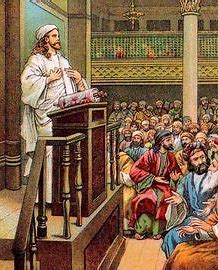And so in Luke 4:14--21 the day arrives…the local boy who has been making quite a name for himself, comes home. He goes to the synagogue on the Sabbath. He reads from Isaiah. He speaks a few words. The crowd whispers its approval: "Mary and Joseph certainly raised a good son." They say. But suddenly the crowd is beginning to get uneasy as his readings continue. Could he be taking Isiah's prophecy too far as if he were the fulfillment of the prophecy. Did they hear correctly?
They’re aware of all the miracles he has performed before returning home. And many had gathered to see him “perform.” Why not a little razzle-dazzle for the home town folks? If Jesus would just do some healings or some other miracle, they would know that God's power was here and now, once and for all, and he would finally drive out the pagan Gentiles and their ungodly influences in the city. But Jesus performs no miracles in Nazareth, and in fact he goes out of his way to defy expected convention by reaching out to sinners, toll collectors and outcasts. So what started as an initially positive response among the assembled, leads to anger and hatred when his mission opens up to include the Gentiles.
The essence of Jesus’ ministry is the love of God for all people. What is it that sparks this abrupt shift from awe to rage for the hearers of Jesus’ words? As for Jesus, it’s hard enough to live up to anticipated expectations. It’s harder still, of course, to meet up with unexpected rejection. There is a very human dimension to this whole story. When the hometown boy makes good, there are usually more than a few who resent his success. Why? As for us, there are all sorts of people in our lives who call us to compassion and justice. Some of them are very ordinary. What is it about the ordinary that’s so hard to see?

No comments:
Post a Comment